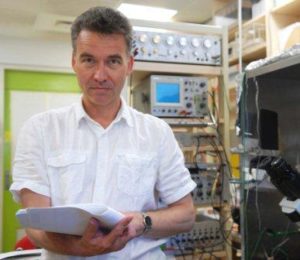 Irritable bowel syndrome is a common gastrointestinal (GI) disorder which impacts one in five Australians at any one time, yet the cause of the condition is unknown.
Irritable bowel syndrome is a common gastrointestinal (GI) disorder which impacts one in five Australians at any one time, yet the cause of the condition is unknown.
Now, researchers from Flinders University are using newly developed technologies to better understand what causes unexplained gut pain, or functional GI disorders, when other more serious conditions such as bowel cancer, Crohn’s disease and colitis have been ruled out.
“Everybody at some stage or another will get pain from their gut due to an infection or inflammation but when it happens regularly, most of the time there’s no detectable reason,” Professor Simon Brookes (pictured), who is leading the research, said.
“Aside from pain and discomfort, functional GI disorders can cause a raft of symptoms including bloating, gas, diarrhoea and constipation, and while these conditions often don’t develop into anything more sinister they can be very unpleasant and distressing,” he said.
Professor Brookes, who heads the Human Physiology Department at Flinders, said the three-year study would seek to understand how different sensory nerves in the gut carry pain signals through the central nervous system to the brain, where it is translated into pain and discomfort.
Using intestinal tissue from humans and animals, Professor Brookes said the researchers would study the mechanisms by which normal and abnormal movements of the intestinal tract activate pain sensory neurons.
“We already know that movements in the gut, particularly gas and distension, give rise to pain but we don’t understand why that is because we don’t understand how pain sensory neurons should work normally,” he said.
“In a lot of cases IBS doesn’t just come out of the blue, it usually follows an infection and we think that’s because the pain detectors become hypersensitive for long periods after the infection is gone, but again we don’t understand why that is.”
He said the research team – which includes Flinders Drs Philip Dinning, Nicholas Spencer and Vladimir Zagorodnyuk – would use new technologies to measure movement and pressure in the gut “more accurately than ever before”.
The same techniques, he said, could also be used to explain baffling cases of pain in other areas of the body.
“Although we’re studying the gut, unexplained pain occurs in other parts of the body too and we think the pain fibres in the gut are very similar in other parts of the body.
“So if we can understand the cause of gut pain, we might be able to apply it to other ailments like headache, bladder pain and period pain.”
The research is being funded through a $537,065 grant from the National Health and Medical Research Council’s 2013 funding scheme, bringing the total pool of funding awarded to Flinders researchers to $6,215,636 across 13 projects.


All the best prof brooks and Nick! you guys are amazing lecturers!